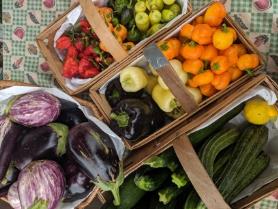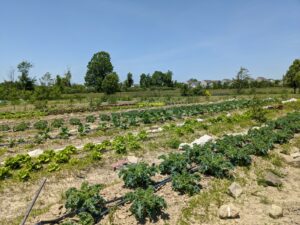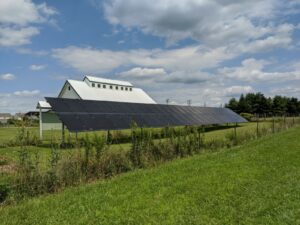Laudato Si': On Care For Our Common Home
“What kind of world do you want to leave those who come after us.” (160)

An Overview of Laudato Si’
Pope Francis’ Laudato Si’ is a first of its kind encyclical. Most papal documents and letters are addressed to the bishops of the Church or the lay faithful. Pope Francis addressed this message to all people. It is an encyclical written for every person on the planet and is a wake-up call to the global community to help our planet by taking action against climate change. Laudato Si’ is a reminder that we are all connected to all of creation, and that we are called to solidarity to bring forward change. Laudato Si’ is a challenge for wealthier nations to take responsibility for their over consumption of natural resources and to realize the impact of this abuse on those who are poor. Pope Francis states the Earth “cries out to us because of the harm we have inflicted on her by our irresponsible use and abuse of the goods with which God has endowed her” (2).
Watch Pope Francis’ 2017 TED Talk entitled ‘Why the Only Future Worth Building Includes Everyone,’. A wonderfully simple overview video of Laudato Si’ can be viewed here.
2020 marks the fifth anniversary of Pope Francis’ call to action encyclical. On May 24th, 2020, it was declared that it was Laudato Si’ Year. A furthered call to create change toward an equitable approach to combating climate change by spurring global citizens to adopt more sustainable practices.
Summary of Laudato Si’
Chapter 1:
This chapter covers what is happening to our ‘common home’. It centers on the scientific consensus that climate change is problematic and is a huge threat to the environment, water supply, and biodiversity. The climate crisis is disproportionately impacting those who are poor.
Chapter 2:
Pope Francis sees faith convictions as a motivator for people to care about those who are vulnerable. As “everything is related, and we human beings are united as brothers and sisters on a wonderful pilgrimage, woven together by the love God has for each of his creatures and which also unites us in fond affection with brother sun, sister moon, brother river and mother earth (92).” The pope concludes that, “The earth is essentially a shared inheritance, whose fruits are meant to benefit everyone (93).” Everything in creation is connected to everything else.
Chapter 3:
Pope Francis asks readers to consider the ‘human roots’ of the current ecological crisis. Although science and technology “can produce important means of improving the quality of human life,” they have also “given those with the knowledge, and especially the economic resources to use them, an impressive dominance over the whole of humanity and the entire world” (103, 104). Our relationship with humanity must be restored to renew our relationship with nature. “To stop investing in people, in order to gain greater short-term financial gain, is bad business for society” (128).
Chapter 4:
Climate change is a complex crisis which is both “social and environmental” (139). Society, economy, and human behavior are all contributing factors. Strategies for a solution must be an integrated approach which seeks to combat poverty, restore dignity to those excluded, as well as protecting nature and humanity. Dialogue needs to occur between religion and science, working together for the common good.
Chapter 5:
Pope Francis calls for dialogue on environmental policy at all levels (international, national, and local). The gravity of the ecological crisis demands that we look to the common good, embarking on a path of dialogue which demands patience, self-discipline, and generosity, always keeping in mind that “realities are greater than ideas” (201). Pope Francis asserts that more needs to be done in regard to conserving energy and natural resources. Religion and science, not just economic interest, should drive decision making.
Chapter 6:
Positive change means not only individual conversations but also community networks working to solve a complex issue. Lifestyles need to be examined and changes made, even if they seem small. Spirituality is essential in that it should motivate us to be filled with compassionate concern to protect our world. Every action that seeks to build a better world will build and make a difference to our common home.
Ways Shepherd’s Corner Embodies Laudato Si’

Although our initial Ask the Land survey predates Pope Francis’ pivotal encyclical, it and the second survey of our 160 acres, reflects the ongoing commitment of the Dominican Sisters of Peace and Shepherd’s Corner Ecology Center to care for all creation.
This survey is Shepherd’s Corner’s way of taking time to slow down and appreciate the flora and fauna that call Shepherd’s Corner home. Knowing what things live here helps us understand the importance of conservation. The survival of not simply ourselves but of all that calls this corner of creation home. More about both Ask the Land surveys and their findings can be found here.




- By growing natural food for donation to those who are in need.
- In picking up trash from the roadsides that border Shepherd’s Corner.
- Through limiting herbicide, pesticide, and fertilizers used to natural products.
- With our solar panels that help us harness the sun’s energy when it is shining.
- By connecting visitors to our corner of creation through programs, our labyrinth, and meditation trail.
“Local individuals and groups can make a real difference. They are able to instill a greater sense of responsibility, a strong sense of community, a readiness to protect others, a spirit of creativity and a deep love for the land.” (179)
What Can I Do?
Pope Francis stated, “in this Encyclical, I would like to enter into dialogue with all people about our common home” (3). How can you enter into dialogue regarding your place in combating climate change? Below are some suggestions to begin with.
-
- Strive to become more aware of your connection to creation. (91)
- How have you lived in communion with nature and all creatures?
- Take inventory of your consumption and consider making changes.
- Seek reusable options over disposable when you are able.
- Be mindful of your use of water.
- When possible, choose less impact creating transportation methods.
- Recycle what you can and make changes to reduce the waste you produce.
- Consider the impact of your diet.
- Remember that small actions can make a difference and inspire others to take action.
A Prayer for Our Earth
All-powerful God, you are present in the whole universe
and in the smallest of your creatures.
You embrace with your tenderness all that exists.
Pour out upon us the power of your love,
that we may protect life and beauty.
Fill us with peace,
that we may live as brothers and sisters, harming no one.
O God of the poor, help us to rescue the abandoned and forgotten of this earth,
so precious in your eyes.
Bring healing to our lives,
that we may protect the world and not prey on it,
that we may sow beauty, not pollution and destruction.
Touch the hearts of those who look only for gain at the expense of the poor and the earth.
Teach us to discover the worth of each thing,
to be filled with awe and contemplation,
to recognize that we are profoundly united with every creature
as we journey towards your infinite light.
We thank you for being with us each day.
Encourage us, we pray, in our struggle for justice, love and peace.
Amen.
Links:
Laudato Si’ Study Guides:
- United States Conference of Catholic Bishops
- Link to National Catholic Reporter
- National Catholic Reporter’s Earth Beat study guide
- Diocese of Columbus’ Creation Care guide
The impact of Laudato Si’:
- The Francis Effect: How Pope Francis Changed the Conversation About Global Warming
- Laudato Si’s impact on the Paris Climate Agreement
Laudato Si’ text:
- English text of Laudato Si’
- Spanish text of Laudato Si’
- Inter Faith Power and Light’s Laudato Si’ Toolkits (English/Spanish)
More Laudato Si’ Related Links:
- Learn about and reduce your carbon footprint:
- Top Ten Takeaways from Laudato Si’
- Laudato Si’ Movement
- NCR Earth Beat
- St. Bruno Parish Laudato Si’ Resources
- Global Catholic Climate Movement: Eco-Parish Guide
Shepherd's Corner
Our Vision:
Shepherd’s Ecology Center is positioning itself to be an Earth-centered leader in the Central Ohio community: teaching environmental education, offering reflective experiences on care of creation, and renewing the land while providing healthy, naturally grown produce.
Our Mission:
Shepherd’s Corner Ecology Center invites others to join with us in experiencing the joys and responsibilities of caring for land, life, and spirit. Inspiring others to become shepherds of creation in their own corners of the world.